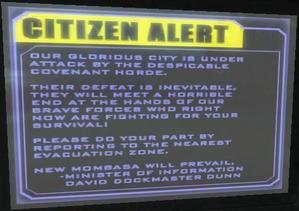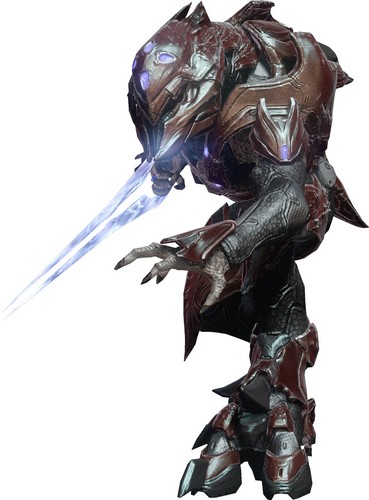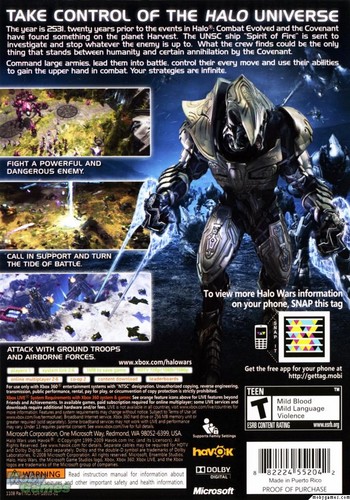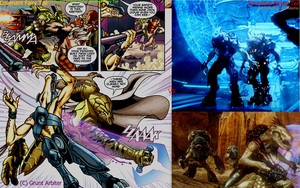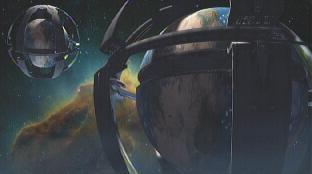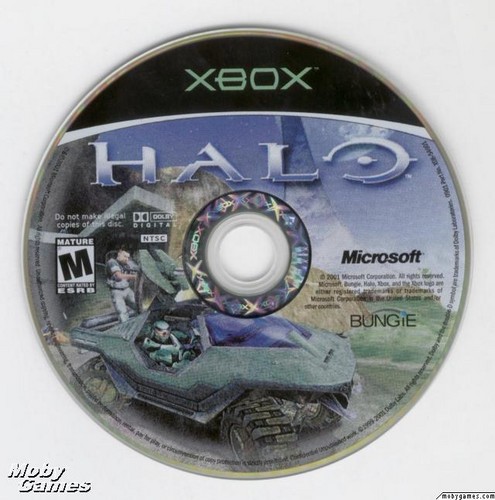Every work of fiction with sufficient content carries within it the political views of the author, whether as a straight political commentary with an intended message, or as a simple story unintentionally affected by the author’s viewpoints. Everybody thinks about the world in a particular way, and these viewpoints are naturally expressed in the formulation of a story. It can be questioned if there is a political message in the Halo series, but I believe the subject is worth some analysis. After all, there are contemporary political issues portrayed in the story, and even if no statement is intended (unlikely, in my opinion) it still bears some looking into to see what the creators said when they told their story. It is at times nearly impossible to separate creator bias from literary depiction, and so I shall deal with both at the same time.
First of all, the humans are all living under the rule of the same government, or at least only the legitimate ones are. The countries of the world have all been absorbed into the United Nations, which became the Unified Earth Government. The UEG, despite being a conglomeration of numerous countries, is essentially American culture, indicating some form of American domination, economic or otherwise. Given that the story of Halo was written to be marketed to an American market, this is unsurprising.
However, traditional American values are not necessarily shared by the UEG. America was founded when it seceded from the British Empire after being subjected to crippling taxes, and fought a war that the American victors have termed the American War of Independence. In contrast, those colonies wishing to secede from the UEG superstate have been termed Insurrectionists, and are treated much as the villains of the conflict. The SPARTAN-II project (controversial at best, what with children being forcibly inducted and flash clones left in their places to keep the parents unaware) was deemed necessary by government officials as a means of securing victory over the Insurrectionists.
Not to say that the Insurrectionists are all fluffy bunnies themselves, though. The rebels, vastly outnumbered, took to utilizing unsavory methods such as piracy and terrorism to accomplish their ends. Therefore, they can perhaps be compared more with modern day enemies of America. The UEG, presented as the natural protagonists, can perhaps be more of a sequential evolution of America, with an evolution of current DHS flaws and paranoia. The Insurrectionists, being more like secessionists than religiously motivated terrorist cells, could perhaps be a commentary on that. We can only speculate.
Moving on, I tried to see if I could identify any instances of discrimination or prejudice in the series. Being of a white male middle-class variety, I am perhaps less suited for this task, but I gave it my best shot. First off, as far as I can tell, there are no explicit instances of sexism either from the creators or within the story.
Dr. Catherine Halsey is the best scientist at the Office of Naval Intelligence and is given the appropriate respect and support for her work. While she may ruffle some feathers, it is more than anything due to her simultaneously being a civilian and receiving more respect than most of the UNSC. Likewise, Rani Sobeck has incredible perception and problem solving abilities, making her the next Sherlock Holmes and early recruit for ONI internal affairs. Although her enemy Standish does make a comment while threatening her death about hating to see a pretty, young girl get executed, the whole conversation is about him feeling superior and draws more on straight power play in that he as a Major can exercise control over a junior-level spook who has been poking into his illicit affairs. It’s also worth noting that he’s a sociopathic murderer who is eventually executed for treason.
Janissary James, a seventeen-year-old girl, is the closest thing Halo has to a superhero. While there are numerous superhuman characters, Jan is the only civilian among them, seemingly ordinary until one day she discovers she has extraordinary abilities. Upon learning that she is, in fact, a Spartan 1.1, she goes out into the world to do some good, such as rescuing some guy about to be killed by gangsters and seriously injuring members of the gang attempting a rape. This ends up landing her in trouble with the gang’s leader, a guy named Thin Kinkle, who kills her father and tries to torture her into loving him. After being rescued by her psycho-killer mother, she leads an attack on Kinkle’s place alongside her mother and ‘Aunt’ Gladys, both Spartan-Is, as well as with the help of feminine AI Durga, and has Kinkle and his boss killed. All strong female figures from an outside point-of-view, and it would appear that sexism wasn’t one of Kinkle’s motivations, but rather that he’s just a messed-up individual. Even the attempted rape was portrayed as simple domination/violation, the motive only to give Kinkle something with which he could use to blackmail the would-be rapist. Although the fact that it is a male attacking a female is evidence of a patriarchal society, there’s only so much that can be done with a society based on contemporary America.
As with the issue of sexism, I have not been able to find explicit instances of racism. The Marine population is pretty diverse, with a collection of various race skins that are generated randomly. Avery Johnson, a black man, featured prominently in all three games, although he remained in a ‘sidekick’ position. Whether or not the main protagonists Cortana and the Master Chief should be considered white is unclear to me. Technically, Cortana’s not even human and the Chief remains encased in green armor, his voice so gravelly no one can tell it’s a white guy voicing him. Even so, there are still ‘semi-white’ characters occupying the main positions, showing bias of the casting director if not out and out racism. The Arbiter, being an alien, probably does not count as a positive example.
"What did the colonial say to the garbage boy? Put me down!"
—Antonio
While instances of racism and sexism may be sketchy, classism is explicitly portrayed as a literary element, also in accompaniment with xenophobia (referring to planets of origin as opposed to countries). With the encroaching Covenant glassing more and more colonies, it became popular for colonists to seek refuge on Earth. This caused an enormous surge in the local population, causing great competition for jobs and increasing the lower-class. As a result, the native Earthlings began developing a xenophobic dislike for the colonial refugees, or “refus” as became the slang term, which happens to sound exactly like “refuse.”
With such a demand for jobs, the bureaucratic red tape greatly slowed down the ability of aspiring immigrants to legally relocate to Earth. The best way for the average colonial to get in is through a scholarship, through which one can attain a student visa. This created a negative stereotype of the refugees as “book smart hicks and grade-grubbers.”
As the ability to get in legally is limited, many subverted the bureaucracy by entering Earth illegally. Life as an illegal immigrant is substantially worse than the legal kind. The UEG maintains control over its civilians through electronic monitoring, in which each person “on the grid” has an identifying chip of some kind that allows them to enter automatic doors, start cars, make monetary transactions, and generally fit into society. Because illegal immigrants must remain outside of legitimate society, they are often subject to the bullying of the criminal element and forced to take any job they can get, unprotected by the police. This all could easily be a commentary on the immigration situation of modern day America.
Next in line, is the issue of homophobia. There are a few explicit derogatory comments from soldiers teasing each other about supposedly exhibiting traits of homosexuality. While this is a mild offense, I would feel better about it if there were any actually gay characters in Halo. As it is, it’s a few straight characters making fun of a minority not actually in the series. Although there are a few lines of combat dialog that present stock soldiers as gay, these cannot be taken seriously given the randomness of the lines. I refuse to acknowledge the existence of a Nipple Academy!
As for ageism, there is a particular instance I can think of. After gangsters kill her father, Jan James attempts to join the UNSC, only to be thwarted by a law stating that only eighteen-year-olds and older can join up. Despite demonstrating immense skill and agility (able to strip clean and reassemble an M6 in one fourth regulation time, able to shoot 99% with an SRS at 1000 meters, and able to read the tiniest font on an eye chart not actually intended as part of the test), the recruiter still insists that she cannot join up. As an explanation, he tells her that if they started letting children join there would be “panic in the streets.” In an attempt to comfort her, he tells her that she should enjoy her childhood and get a boyfriend. Never mind the fact that she’s light-years ahead of anyone else likely to be recruited, including Jersey Morelli, an eighteen-year-old goofball who even his best friend Durga says would be a terrible soldier, ironically set to be drafted in a week or two. She ends up doing the sensible thing and joins a vigilante group planning to fight the Covenant on their own terms.
As for religious conflicts, there are no instances as far as I can tell among the humans. Religious beliefs are diverse and treated as a personal matter, more as facets of individual characters than anything. Although it does seem that Christian swear words are in (“Jesus H., Rani!”), there’s no pressure to conform to religious expectations. Again, this is only among the humans.
The Covenant, on the other hand, is a very hostile theocracy that forces their religion on others with deadly force. Their beliefs in the Great Journey are strong, and to reach that transcendence they are willing to kill any heathens who question their beliefs. When the Great Journey is achieved, it is thought that the divine wind of Halo will carry them to salvation while simultaneously obliterating the unworthy. Divine justice, as it were.
This hostile religious faction up against the peacefully diverse UEG calls to mind the image of radical Islam threatening America. Since the Islamic terrorist strike of 9/11 and the subsequent wars, that image has been close on the minds of the American public. The Covenant’s religious myth, following the Forerunners as deities, seems very similar to the Abrahamic religions (Judaism, Christianity, and Islam). This way of depicting a religion similar but different in a bad way can be interpreted as a villainous depiction of the intolerant force senselessly attacking supposedly tolerant America.
And Covenant myth is related strongly to Forerunner culture. The Forerunner, in similar Abrahamic style, believed that they had been given a Mantle by god-like Precursors, establishing their authority and sense of duty to uphold moral standards. Less like the Abrahamic religions and closer to Buddhism is the belief that, by accomplishing certain tasks, the Forerunner could ascend to the god-like state of their Precursor benefactors.
What resulted was a culture possessing enormously powerful technology, predominantly convinced that they had a right to do whatever they wanted as long as it fulfilled the ancient code of conducts. This led military leaders to believe that the Flood stood as the last great obstacle in the universe, that by defeating they could ascend to Precursor-state. So, despite having the Flood sufficiently contained, they created 032 Mendicant Bias to help destroy it. This could be a commentary on modern authoritative views, promoting peace over the engaging of systematic destruction—more of a liberal perspective.
"Do I take life, or do I give it? Who is friend, and who is foe?"
—Gravemind
And the ultimate threat to all factions is the Flood and its Graveminds. The Graveminds are collective intelligences comprised of facets of all Flood within a certain range. Whether or not all Graveminds represent the same individual persona is unclear. The one featuring in Halo 2 and Halo 3 certainly speaks as though it is the same as the one in the Forerunner era, so I’m going to assume its implication is accurate.
The Gravemind is, in a sense, self-worshiping. It believes that the Flood is the greatest life form in the universe, and that it is its duty to consume all sentient life and bring their consciousnesses into its collective. Moreover, due to its great conviction in its beliefs, it is at times able to persuade its enemies into working alongside it, as was the case with Mendicant Bias. When the Master Chief came to rescue Cortana, it tried its old trick on him, with limited results.
When the Covenant acquired the Index back in Halo 2, the Gravemind decided its chances of survival would be better if it made a truce with the Chief and the Arbiter. Although it broke the truce shortly after, it created another once again in Halo 3 when Truth was perilously close to activating Halo. Master Chief, the Arbiter, and the Flood fought alongside for once, “as brothers” as the Gravemind put it. However, once the danger was over, the Gravemind let out an evil laugh and moved in for the kill.
Timeless, treacherous, and eloquently articulate, the Gravemind strikes me as symbolic of the Devil. Bungie was obviously influenced by the bible, and as much as the Forerunners take the place of God, the Gravemind plays the part of the Devil. Although it is defeated at the end of Halo 3, it seems as though it will recover its strength once again at some point in the future. Some final battle?
In conclusion, there’s a lot of stuff going on in Halo, both explicitly and as implicit aspects of the environment. Political issues are always controversial and thus somewhat hard to analyze and interpret. It is important to remember that often the mere act of interpreting something imbues it with qualities the creator did not intend, so whatever truth may have been gleaned is, in effect, the interpreter projecting their own viewpoints onto the work. Although I tried to avoid this, I suspect it is unavoidable anyway. In the immortal words of the Prophet of Truth:
Politics… How tiresome…
First of all, the humans are all living under the rule of the same government, or at least only the legitimate ones are. The countries of the world have all been absorbed into the United Nations, which became the Unified Earth Government. The UEG, despite being a conglomeration of numerous countries, is essentially American culture, indicating some form of American domination, economic or otherwise. Given that the story of Halo was written to be marketed to an American market, this is unsurprising.
However, traditional American values are not necessarily shared by the UEG. America was founded when it seceded from the British Empire after being subjected to crippling taxes, and fought a war that the American victors have termed the American War of Independence. In contrast, those colonies wishing to secede from the UEG superstate have been termed Insurrectionists, and are treated much as the villains of the conflict. The SPARTAN-II project (controversial at best, what with children being forcibly inducted and flash clones left in their places to keep the parents unaware) was deemed necessary by government officials as a means of securing victory over the Insurrectionists.
Not to say that the Insurrectionists are all fluffy bunnies themselves, though. The rebels, vastly outnumbered, took to utilizing unsavory methods such as piracy and terrorism to accomplish their ends. Therefore, they can perhaps be compared more with modern day enemies of America. The UEG, presented as the natural protagonists, can perhaps be more of a sequential evolution of America, with an evolution of current DHS flaws and paranoia. The Insurrectionists, being more like secessionists than religiously motivated terrorist cells, could perhaps be a commentary on that. We can only speculate.
Moving on, I tried to see if I could identify any instances of discrimination or prejudice in the series. Being of a white male middle-class variety, I am perhaps less suited for this task, but I gave it my best shot. First off, as far as I can tell, there are no explicit instances of sexism either from the creators or within the story.
Dr. Catherine Halsey is the best scientist at the Office of Naval Intelligence and is given the appropriate respect and support for her work. While she may ruffle some feathers, it is more than anything due to her simultaneously being a civilian and receiving more respect than most of the UNSC. Likewise, Rani Sobeck has incredible perception and problem solving abilities, making her the next Sherlock Holmes and early recruit for ONI internal affairs. Although her enemy Standish does make a comment while threatening her death about hating to see a pretty, young girl get executed, the whole conversation is about him feeling superior and draws more on straight power play in that he as a Major can exercise control over a junior-level spook who has been poking into his illicit affairs. It’s also worth noting that he’s a sociopathic murderer who is eventually executed for treason.
Janissary James, a seventeen-year-old girl, is the closest thing Halo has to a superhero. While there are numerous superhuman characters, Jan is the only civilian among them, seemingly ordinary until one day she discovers she has extraordinary abilities. Upon learning that she is, in fact, a Spartan 1.1, she goes out into the world to do some good, such as rescuing some guy about to be killed by gangsters and seriously injuring members of the gang attempting a rape. This ends up landing her in trouble with the gang’s leader, a guy named Thin Kinkle, who kills her father and tries to torture her into loving him. After being rescued by her psycho-killer mother, she leads an attack on Kinkle’s place alongside her mother and ‘Aunt’ Gladys, both Spartan-Is, as well as with the help of feminine AI Durga, and has Kinkle and his boss killed. All strong female figures from an outside point-of-view, and it would appear that sexism wasn’t one of Kinkle’s motivations, but rather that he’s just a messed-up individual. Even the attempted rape was portrayed as simple domination/violation, the motive only to give Kinkle something with which he could use to blackmail the would-be rapist. Although the fact that it is a male attacking a female is evidence of a patriarchal society, there’s only so much that can be done with a society based on contemporary America.
As with the issue of sexism, I have not been able to find explicit instances of racism. The Marine population is pretty diverse, with a collection of various race skins that are generated randomly. Avery Johnson, a black man, featured prominently in all three games, although he remained in a ‘sidekick’ position. Whether or not the main protagonists Cortana and the Master Chief should be considered white is unclear to me. Technically, Cortana’s not even human and the Chief remains encased in green armor, his voice so gravelly no one can tell it’s a white guy voicing him. Even so, there are still ‘semi-white’ characters occupying the main positions, showing bias of the casting director if not out and out racism. The Arbiter, being an alien, probably does not count as a positive example.
"What did the colonial say to the garbage boy? Put me down!"
—Antonio
While instances of racism and sexism may be sketchy, classism is explicitly portrayed as a literary element, also in accompaniment with xenophobia (referring to planets of origin as opposed to countries). With the encroaching Covenant glassing more and more colonies, it became popular for colonists to seek refuge on Earth. This caused an enormous surge in the local population, causing great competition for jobs and increasing the lower-class. As a result, the native Earthlings began developing a xenophobic dislike for the colonial refugees, or “refus” as became the slang term, which happens to sound exactly like “refuse.”
With such a demand for jobs, the bureaucratic red tape greatly slowed down the ability of aspiring immigrants to legally relocate to Earth. The best way for the average colonial to get in is through a scholarship, through which one can attain a student visa. This created a negative stereotype of the refugees as “book smart hicks and grade-grubbers.”
As the ability to get in legally is limited, many subverted the bureaucracy by entering Earth illegally. Life as an illegal immigrant is substantially worse than the legal kind. The UEG maintains control over its civilians through electronic monitoring, in which each person “on the grid” has an identifying chip of some kind that allows them to enter automatic doors, start cars, make monetary transactions, and generally fit into society. Because illegal immigrants must remain outside of legitimate society, they are often subject to the bullying of the criminal element and forced to take any job they can get, unprotected by the police. This all could easily be a commentary on the immigration situation of modern day America.
Next in line, is the issue of homophobia. There are a few explicit derogatory comments from soldiers teasing each other about supposedly exhibiting traits of homosexuality. While this is a mild offense, I would feel better about it if there were any actually gay characters in Halo. As it is, it’s a few straight characters making fun of a minority not actually in the series. Although there are a few lines of combat dialog that present stock soldiers as gay, these cannot be taken seriously given the randomness of the lines. I refuse to acknowledge the existence of a Nipple Academy!
As for ageism, there is a particular instance I can think of. After gangsters kill her father, Jan James attempts to join the UNSC, only to be thwarted by a law stating that only eighteen-year-olds and older can join up. Despite demonstrating immense skill and agility (able to strip clean and reassemble an M6 in one fourth regulation time, able to shoot 99% with an SRS at 1000 meters, and able to read the tiniest font on an eye chart not actually intended as part of the test), the recruiter still insists that she cannot join up. As an explanation, he tells her that if they started letting children join there would be “panic in the streets.” In an attempt to comfort her, he tells her that she should enjoy her childhood and get a boyfriend. Never mind the fact that she’s light-years ahead of anyone else likely to be recruited, including Jersey Morelli, an eighteen-year-old goofball who even his best friend Durga says would be a terrible soldier, ironically set to be drafted in a week or two. She ends up doing the sensible thing and joins a vigilante group planning to fight the Covenant on their own terms.
As for religious conflicts, there are no instances as far as I can tell among the humans. Religious beliefs are diverse and treated as a personal matter, more as facets of individual characters than anything. Although it does seem that Christian swear words are in (“Jesus H., Rani!”), there’s no pressure to conform to religious expectations. Again, this is only among the humans.
The Covenant, on the other hand, is a very hostile theocracy that forces their religion on others with deadly force. Their beliefs in the Great Journey are strong, and to reach that transcendence they are willing to kill any heathens who question their beliefs. When the Great Journey is achieved, it is thought that the divine wind of Halo will carry them to salvation while simultaneously obliterating the unworthy. Divine justice, as it were.
This hostile religious faction up against the peacefully diverse UEG calls to mind the image of radical Islam threatening America. Since the Islamic terrorist strike of 9/11 and the subsequent wars, that image has been close on the minds of the American public. The Covenant’s religious myth, following the Forerunners as deities, seems very similar to the Abrahamic religions (Judaism, Christianity, and Islam). This way of depicting a religion similar but different in a bad way can be interpreted as a villainous depiction of the intolerant force senselessly attacking supposedly tolerant America.
And Covenant myth is related strongly to Forerunner culture. The Forerunner, in similar Abrahamic style, believed that they had been given a Mantle by god-like Precursors, establishing their authority and sense of duty to uphold moral standards. Less like the Abrahamic religions and closer to Buddhism is the belief that, by accomplishing certain tasks, the Forerunner could ascend to the god-like state of their Precursor benefactors.
What resulted was a culture possessing enormously powerful technology, predominantly convinced that they had a right to do whatever they wanted as long as it fulfilled the ancient code of conducts. This led military leaders to believe that the Flood stood as the last great obstacle in the universe, that by defeating they could ascend to Precursor-state. So, despite having the Flood sufficiently contained, they created 032 Mendicant Bias to help destroy it. This could be a commentary on modern authoritative views, promoting peace over the engaging of systematic destruction—more of a liberal perspective.
"Do I take life, or do I give it? Who is friend, and who is foe?"
—Gravemind
And the ultimate threat to all factions is the Flood and its Graveminds. The Graveminds are collective intelligences comprised of facets of all Flood within a certain range. Whether or not all Graveminds represent the same individual persona is unclear. The one featuring in Halo 2 and Halo 3 certainly speaks as though it is the same as the one in the Forerunner era, so I’m going to assume its implication is accurate.
The Gravemind is, in a sense, self-worshiping. It believes that the Flood is the greatest life form in the universe, and that it is its duty to consume all sentient life and bring their consciousnesses into its collective. Moreover, due to its great conviction in its beliefs, it is at times able to persuade its enemies into working alongside it, as was the case with Mendicant Bias. When the Master Chief came to rescue Cortana, it tried its old trick on him, with limited results.
When the Covenant acquired the Index back in Halo 2, the Gravemind decided its chances of survival would be better if it made a truce with the Chief and the Arbiter. Although it broke the truce shortly after, it created another once again in Halo 3 when Truth was perilously close to activating Halo. Master Chief, the Arbiter, and the Flood fought alongside for once, “as brothers” as the Gravemind put it. However, once the danger was over, the Gravemind let out an evil laugh and moved in for the kill.
Timeless, treacherous, and eloquently articulate, the Gravemind strikes me as symbolic of the Devil. Bungie was obviously influenced by the bible, and as much as the Forerunners take the place of God, the Gravemind plays the part of the Devil. Although it is defeated at the end of Halo 3, it seems as though it will recover its strength once again at some point in the future. Some final battle?
In conclusion, there’s a lot of stuff going on in Halo, both explicitly and as implicit aspects of the environment. Political issues are always controversial and thus somewhat hard to analyze and interpret. It is important to remember that often the mere act of interpreting something imbues it with qualities the creator did not intend, so whatever truth may have been gleaned is, in effect, the interpreter projecting their own viewpoints onto the work. Although I tried to avoid this, I suspect it is unavoidable anyway. In the immortal words of the Prophet of Truth:
Politics… How tiresome…


